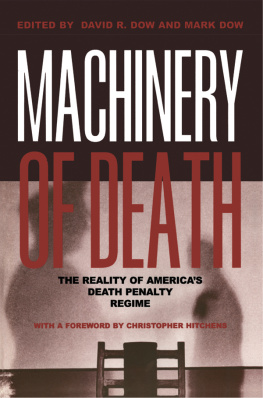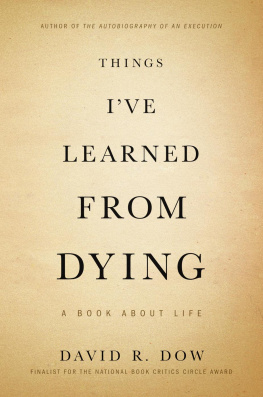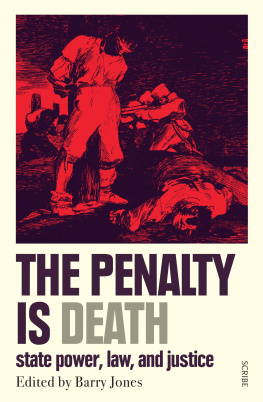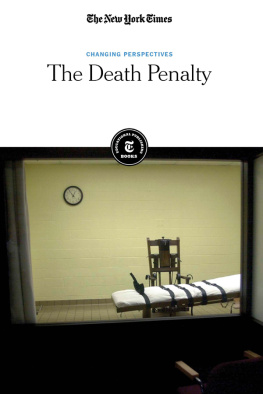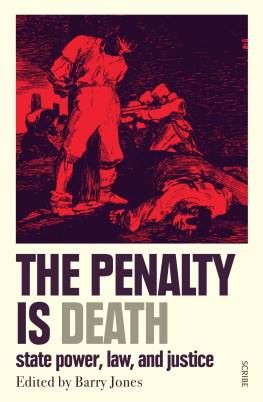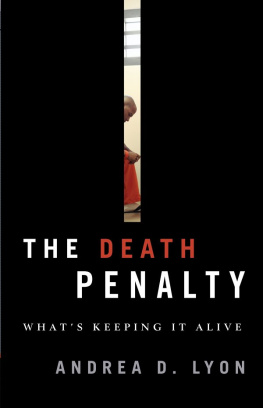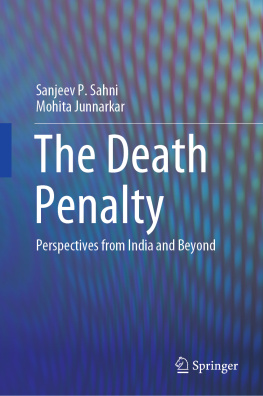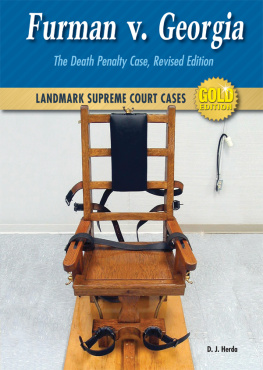Published in 2002 by
Routledge
711 Third Avenue,
New York, NY 10017
Published in Great Britain by
Routledge
2 Park Square, Milton Park,
Abingdon, Oxon OX14 4RN
Routledge is an imprint of the Taylor & Francis Group, an informa business
Copyright 2002 by Routledge
All rights reserved. No part of this book may be reprinted or reproduced or utilized in any form or by any electronic, mechanical, or other means, now known or hereafter invented, including photocopying and recording or in any information storage or retrieval system, without permission in writing from the publishers.
Library of Congress Cataloging-in-Publication Data
Machinery of death : the reality of Americas death penalty regime / edited by David R. Dow and Mark Dow ; with a foreword by Christopher Hitchens.
p. cm.
Includes bibliographical references and index.
ISBN 0-415-93266-1 ISBN 0-415-93267-X (pbk.)
1. Capital punishment United States. I. Dow, David, 1959- II. Dow, Mark.
MV8699.U5 M29 2002
364.660973dc21 |
2001048409 |
Abolitionist is a term with a noble pedigree, even though its exact lineage cannot be determined. We cannot really know at what point it was determined to cleanse America of slavery. Was it the murder of Elijah Lovejoy? The publication of Uncle Toms Cabin? The attack on Harpers Ferry? Abraham Lincolns Second Inaugural? A whole train of alternately disgraceful and heroic events has to be reviewed. I would personally select, as the moments that sounded the end of mans legal property in man, the Dred Scott decision by the Supreme Court and the passage of the Fugitive Slave Act. For it was only in the moments of its greatest apparent triumphs that the cause of slaveholding revealed itself in all its inhumanity, irrationality, and exorbitance.
I believe that we now live in the preabolitionist phase of capital punishment in the United States. And, by a somewhat extended analogy, I believe that the great triumphs of the death-penalty faction were precisely the moments that prefigured that penaltys coming eclipse. I mean by these triumphs the passage by President Bill Clinton of the Anti-Terrorism and Effective Death Penalty Act [hereafter AEDPA] and the consequent federal execution of the death sentence passed upon Timothy McVeigh.
Clintons AEDPA vastly increased the number of capital crimes, and greatly shrank the opportunities open to those charged with such offenses. While the judicial killing of McVeigh, widely advertised as a potential moment of catharsis and clarification, became instead an occasion of monumental state and police bungling, resulting in a spectacle that was obscene both as climax andperhaps more importantly as anticlimax. It turned out, both in the macro sense and also in the specific and micro sense, that the machinery of human sacrifice was suffering from an irreparable series of malfunctions, and falling victim to rapidly diminishing returns.
One might profitably pause for a moment and recollect the argument as it stood at the beginning of the 1990s. The only real question seemed to be, Could the Democratic Party become as plausible a spokesman for human sacrifice as the Republican Party? Governor Clintons execution of the lobotomized Rickey Ray Rector during the New Hampshire primary elections of 1992 seemed to close this apparent gap, and voters continually reported to pollsters and others with much the same lack of concern about such episodes as liberal intellectuals had registered in the case of the Rector atrocity. To be an abolitionist at that period was, in the terms of our beloved consensus, to be a quixotic or freakish curiosity, the equivalent of a village atheist in the Bible Belt.
The difference made by the ensuing decade is a truly remarkable one. Today, it is the proponents of human sacrifice who are on the defensive. One might mention the following factors in almost any order:
1. Republican governor George Ryan of Illinois, a strong and consistent advocate of the death penalty, felt compelled to announce a moratorium on executions after discovering that his states death row contained more innocent than guilty occupants. Illinois had at that moment come within a day or two of murdering an innocent and mentally defective man.
2. Republican George W. Bush, then governor of Texas, had been secure enough in what he imagined to be popular esteem as to make jokes about the execution of a woman named Karla Faye Tucker, and about the execution of a Canadian whose sentence had not been disclosed to the Canadian consulate. His state was found to be putting down the mentally retarded, and to be failing to furnish defendants in capital cases with even the decent minimum of a court-appointed defense. His evident lack of concern about this, and his puerile celebrations of his own toughness, had the effect of disturbing more people than it enthused or reassured. (AI Gores solidarity with Bush on the subject, evidenced in the presidential debates, probably did little to dispel the gathering sense of revulsion.)
3. The findings of the Sentencing Project, with its expertise in the new field of DNA evidence, materialized the already widespread and justified suspicion that innocent people have been framed, or railroaded, or made the victims of incompetent and slovenly procedures.
4. Partly transmitted from Americas darker past, and partly confirmed by recent disclosures and examples, the ineffaceable stain of racial discrimination was associated with the death penalty and remained, in the public mind, a specific misgiving about it. Whenever a luckless person was saved from death row at the last moment (as recently happened because of the chance efforts of a class in a journalism school in Illinois), he invariably turned out to be a member of the so-called underclass, a class somewhat conspicuously color coded.
To these recent developments, several of them directly related to the fast tracking of capital cases and the abbreviation of the appeals procedureghastly features of the Bill Clinton/Dick Morris AEDPA initiative we can add three tendencies that have had a longer-term and slower but germinal effect. The first of these is the moral influence of Pope John Paul II. I say this with due reluctance, as a committed atheist and critic of the Church, but the reign of the present pope has seen the principled near-condemnation of capital punishment. Rome has not yet seen fit to anathematize the practice, but has made abundantly clear that it can be justified only in the most extraordinary cases. (There is a latent relationship here with the debate on a consistent life ethic that arose from the abortion controversy, but this is not the place to discuss it.) I remember interviewing Mario Cuomo a short while after his electoral defeat as governor of New York. He complained wryly that the papal encyclicals on the death penalty were read from the pulpitbut on the Sunday after the election rather than the Sunday before it. This is no longer the case; every serious and believing Catholic is quite aware of Church teaching on the subject, and the pope himself has made several very public intercessions for clemency in a number of high-profile American cases.


